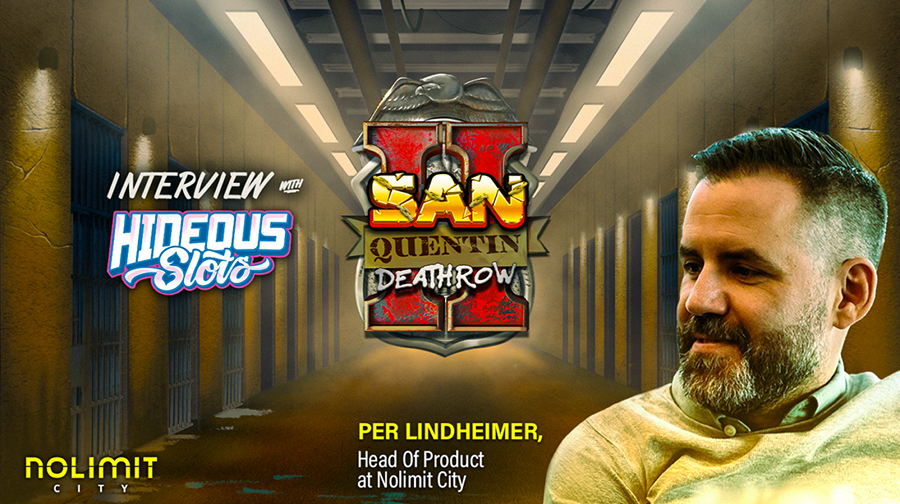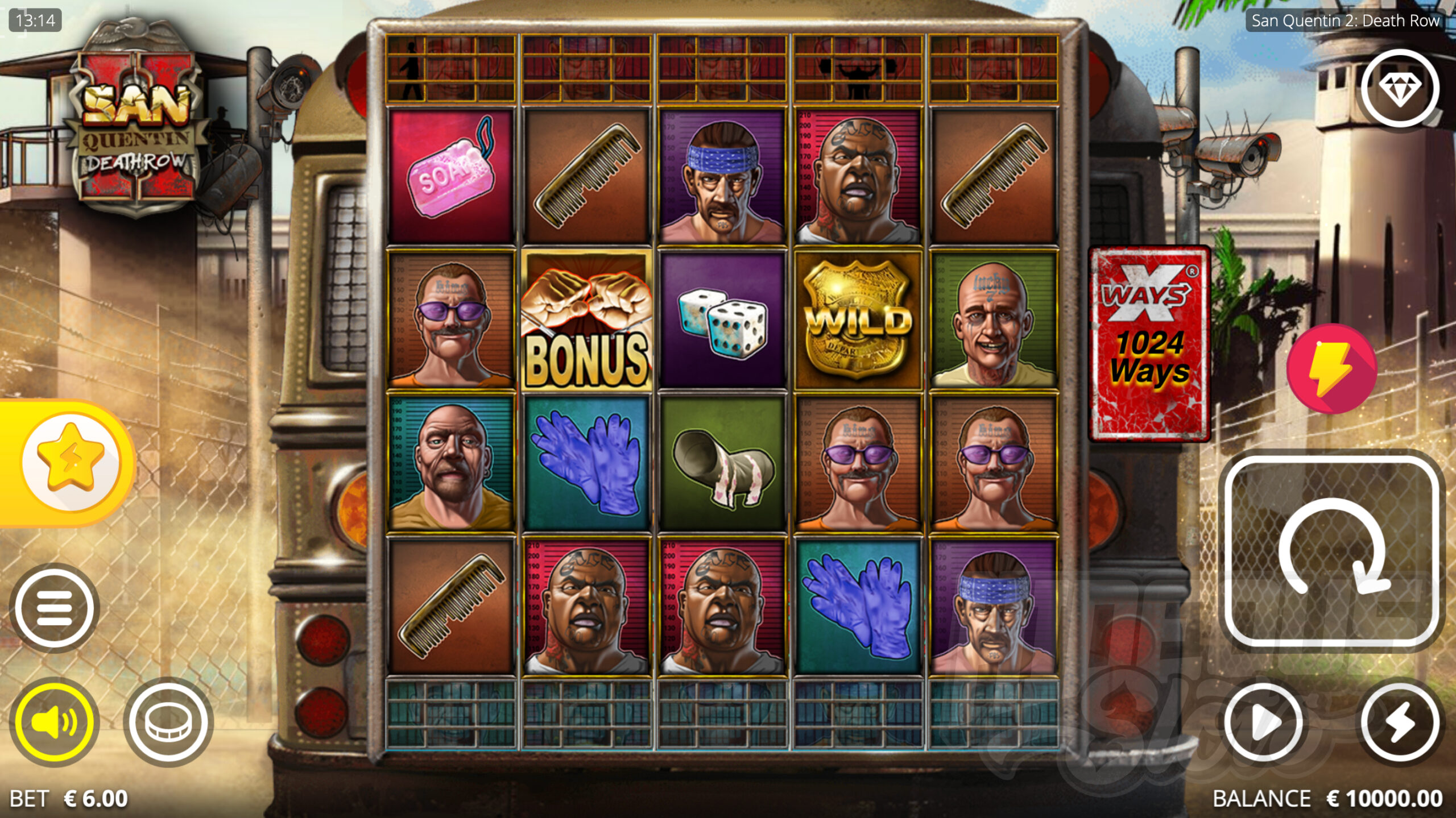Interview
San Quentin 2 – Interview with Nolimit City
20 Sep 24 Chloe
More News & Blog
Quick Picks: Slots
Our 5 Favourite Anime-Themed Slots
4 Mar 26
Quick Picks: Slots
Top 6 Motorsports-Themed Slots for F1 Fans
25 Feb 26
Blog
Luck vs. Skill in Online Gambling
20 Feb 26
Quick Picks: Slots
7 Slots to Celebrate Pancake Day
16 Feb 26
Quick Picks: Slots
Best Winter Sports Slots Inspired by the Olympics
9 Feb 26

Interview with Per Lindheimer
It's not often a truly groundbreaking slot sequel hits the market, no matter how many times it's tried.
Creating the perfect sequel is a delicate balancing act, with teams focusing on upgrading features, offering better potential and improving audiovisuals to create something that feels worthy of its name.
One studio who have been revisiting older releases lately are Nolimit City, who have released Fire in the Hole 2, a few RIP titles such as Tombstone RIP and Deadwood RIP, and who are now bringing us the most hotly anticipated sequel of the year – San Quentin 2: Death Row.
We sat down with Per Lindheimer, Head of Product at Nolimit City, to find out some more about this release, the team's approach and how it compares to their RIP releases.

San Quentin 2: Death Row Base Game
Chloe: Hi Per, thanks for talking to us! San Quentin kicked off an incredible year for Nolimit City in 2021 and was immediately lauded as the biggest release to date. How soon after did the team decide they wanted to do a sequel, or was this something that was always in the pipeline?
Per: No sequels were “always in the pipeline” for us a few years back, but we did follow-ups to titles. We’ve always believed that we can make our own IPs and characters to build upon.
San Quentin was definitely one of those games, but the first out on the sequel list was Fire in the Hole. It just felt like a better game to start with, especially with the previous follow-ups like Misery Mining and Dead Canary.
San Quentin is however a beast on its own. It’s a bit daunting for all of us to jump on a sequel given the incredible success of the first game. It gives us so many fun things to update and make better – but there’s always pressure to deliver and not screw up a title like this!
We always want to find a twist to it – not something that is expected. Something new, something cool…
Chloe: We see a few different approaches with sequels, but the most popular seems to be “similar, but better”. Do you think this is the approach the team took with San Quentin 2: Death Row?
Per: Similar but better is a good approach for some games. It goes hand in hand with what I said previously – you want to keep the good stuff from the previous games and build upon that.
Sometimes you can be braver – sometimes you take it back a notch.
You’ll see more sequels from us – we’ve just started with San Quentin 2, FITH2 and Punk Rocker 2. Not too many at once of course, the ideas need to be better and that can take time to get right!
Chloe: Did the team take this as an opportunity to tweak the original concept, or do you still consider San Quentin to be perfect in its own right? Was there anything that you knew from the start should not be changed?
Per: Nothing is perfect. It can be close to perfect, but the amount of work to reach the perfection you at times want is usually just not worth it.
We spend tons of time on every slot – and you’re always super happy when it’s released, but then new things grow on you about what you should’ve done.
Often times, you look at the game in a new way once it’s released and you’re not able to do much more to it. This was a new approach to the game – with a few old dudes who did SQ and also with a few new dudes who came in with new ideas.
It’s a mash of good things, but with a solid foundation of the old game of course.
There isn't anything that is super holy in terms of “don’t touch this at all”, but parts of it were pretty easy for all of us to align to keep. The first San Quentin game is just very, very good to begin with.
Chloe: What was the hardest part of creating San Quentin 2: Death Row, and do you think this was amplified by the expectation players have of the game?
Per: Graphics style. How much should we change it – how much should we change the pace.
We’ve done a few do-overs in this project when we felt that it didn’t come out how we wanted it to. Expectations are high from players, but expectations are also very high internally.
For Fire in the Hole 2 we chose to “go back to its origin”, which was a strategy set from the get-go. This felt right when we’ve already done new and weird versions of the game with, for example, Dead Canary. More of a step back in some ways, but also felt fun to be true to its beginning.
We got quite a few remarks internally about this choice, but we stood our ground. The game turned out great in the end, but you don’t really know that until you’ve released it…
We like to keep things under wraps when it comes to the sequels – we want it to be released with a bang!
Chloe: Nolimit City are most notably known for their intensely volatile maths models. How did you mathematically approach a sequel to a game that was already regarded as incredibly volatile with one of the most impressive maximum wins on the market?
Per: The easy route is to up max wins to the next level. But is that always fun? There need to be some more to it, and a reason for it.
There’s a risk of going too much and also quite easy to go a route that is just boring and what’s “the expected route”.
We always want to find a twist to it – not something that is expected. Something new, something cool – and still not being weird for the sake of being weird. It’s not easy – and I’m sure we overstep it at times.
Chloe: San Quentin 2: Death Row has a distinctive art style and will undoubtably have a worthy soundtrack; was this one of the main ways the team wanted to set it apart from its predecessor?
Per: There are some distinct characteristics in this game that we’ll change – it’s the same sound dude that makes this one (David) as before, but it won’t be the exact same, that’s for sure.
There are changes going on with this game at the moment, and sound is always one of the last things that gets added to the game. This game has a different and more sinister aura than the previous game.
Chloe: Did you take any player feedback on board when creating San Quentin 2: Death Row?
Per: We read a lot of the comments and received a lot of feedback from different sources on all games – and especially listened to the stuff that was said about the original San Quentin – and that has of course gone into this game.
It’s a very loved (and hated) game, and players have been quite outspoken about it in the past. But we haven’t picked a number of well-known players to do any gameplay on it beforehand.
We like to keep things under wraps when it comes to the sequels – we want it to be released with a bang!
Chloe: We’ve already received Fire in the Hole 2 and Punk Rocker 2 this year and are eagerly awaiting the release of San Quentin 2: Death Row and Blood & Shadow 2. Do you think we’ll continue to see more sequels from Nolimit City in the future?
Per: For sure. We’ll do a couple more to begin with, but the idea needs to be good and not just “do it because it's a sequel” – it has to be a few fantastic ideas for it to progress from the origin.
Is there anyone in particular that you would like us to have a look at? If so, let us know…
Chloe: Do you consider it more difficult to ‘R.I.P’ a game, like with Tombstone R.I.P and Deadwood R.I.P, or to create an officially labelled sequel? How does the approach in these two circumstances differ?
Per: It’s a very different approach – especially with the xRIP-games that have that very distinct feature and brutal max exposure and hit frequency.
It demands quite a bit on the chosen features and also how the origin was set up.
I’ve always actually seen xRIP to be a feature that should work in any game – to skip the smaller “keep me alive-wins” and push that payout into features and bonus modes, but I’ve also been a little hesitant to do it as well – it's aimed for completely different types of players.
Chloe: If you could create a sequel to any game in the Nolimit City catalogue, is there any you would personally love to see?
Per: I’ve got a long list of games that I have some extra love for in our portfolio.
I've given some extra love to our classic xNudge titles in Tombstone and Deadwood before – I’ve got a few completely different titles that have a very different gameplay then these two, and it’s The Crypt (or Dragon Tribe for that matter!) and xWays Hoarder.
Those two games would be fun to take to another level.
Latest News & Blog
Quick Picks: Slots
Our 5 Favourite Anime-Themed Slots
Back in the day, openly admitting you liked anime might have got you some funny looks or raised eyebrows at school.
Terms like “weeaboo” (or weeb, for short) were meant as insults to those who were maybe a little too into Japanese culture, anime, and manga.
4 Mar 26
Quick Picks: Slots
Top 6 Motorsports-Themed Slots for F1 Fans
If you’re counting down the days until the next F1 weekend, spinning motorsports-themed slots are the perfect way to spend your time, tapping into that same competitive spirit.
25 Feb 26
Blog
Luck vs. Skill in Online Gambling
In life, there are some debates that are just timeless; does pineapple belong on pizza, were Ross and Rachel actually on a break, and the big one: does luck or skill play a bigger role in gambling?
20 Feb 26
